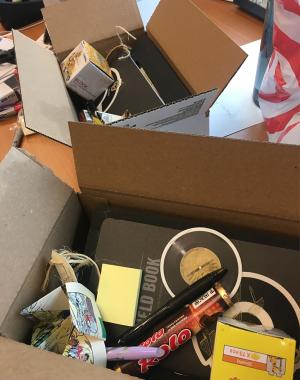Unboxing technology’s role in diversity, equity and inclusion
For more than 20 years, the University of Colorado has offered the COLTT conference, focused on teaching and learning with technology to participants across the state and beyond. COLTT (Colorado Learning and Teaching with Technology) has a history of outstanding content and speakers, and this year is no different.
This year’s Aug. 5-6 conference will be virtual with focus on the intersection of technology with diversity, equity and inclusion. Click here to register to attend.
“The Colorado Learning and Teaching with Technology conference is an excellent way for educators to not only learn valuable information about teaching with technology, but also challenges the way they think about doing so,” said CU President Mark Kennedy. “Today’s pandemic world magnifies the need for the effective use of technology in teaching and learning, so COLTT will be particularly valuable this year.”
Here is a preview of what you can expect at COLTT 2020.
Praveen Shanbhag, Founder and CEO of NameCoach, is participating in the Aug. 5 panel discussion, You Matter. You Belong: A conversation with diversity and inclusion experts. Systemic racism and the events that have unfolded across America over the past few months serve as an urgent reminder of the continued change needed in our society and its institutions. As members of the ed-tech community, it is crucial that we are attuned to the racial injustices in a larger sense and are aware that this issue is present in every aspect of our work in higher education. The panel will be a conversation about creating a culture of diversity and inclusion and taking actionable steps toward equality for all.
NameCoach is a tech company that aims to solve the common problem of name mispronunciation and gender pronoun communication in as many critical settings as possible. It provides audio name pronunciations embedded online to easily learn and remember how to say them.
Here’s a Q&A with Praveen Shanbhag.
1. The NameCoach tool provides curated audio name pronunciations in the tools you use, to promote respect, inclusion and belonging in every interaction. Can you share its origin story?
NameCoach started as a passion project because my sister had her name butchered at her undergrad commencement ceremony. It was a very alienating experience for her and our family and I knew that she/us were not the only ones that experienced this feeling. This is something that happens on a daily basis and impacts a majority of us. We started in the commencement space, but quickly expanded our offerings to focus on belonging and community for all students/faculty/staff through integrations in enrollment services, advisory services, LMS, SIS, all the way to alumni/advancement. Today we have hundreds of university partners all over the world.
2. What demographics benefit most from the use of accurate name pronunciation software?
We’ve noticed that NameCoach supports all demographics. It helps create a sense of belonging from Day One at the university which ultimately helps all students. A recent survey from Salesforce shows that 75% of students would choose their university based on a sense of belonging. If a student feels like they belong, they are more likely to stay in school and have lower stress and anxiety levels. It’s sometimes thought that lots of names are ‘easy’ enough for anyone to know how to say. But we’re always surprised at how many people get their names mispronounced and tell us their stories – and more importantly, we can’t assume that everyone will have familiarity with how you say your name in an increasingly diverse world. Everyone in a school community benefits from helping others say their name, and learning how to say others’ names.
3. You will be on the panel for the COLTT session, You Matter. You Belong: A conversation with diversity and inclusion experts. Can you give us a sneak peek at what you hope to be able to share?
I hope to be able to share our company view on how a sense of belonging can truly impact someone’s life.
There is a great quote from an article someone at Michigan Tech wrote that I think shows just how impactful belonging is in Higher Ed: “Learning and correctly pronouncing names is challenging, but it’s one of the best things an instructor can do (and encourage students to do) to promote community in a class. There’s evidence that learning names can reduce cheating, increase academic performance, and aid in classroom management.”
We need to stop spending so much time focusing on the mistakes students might make, and instead make them feel supported and part of a community, to keep them more engaged and ultimately perform better. We need students to know they belong to keep them in school and promote the importance of education and the positive impact they can have on this world. We need to model values to them that they can take into the world and exemplify so that societal change is sustained into the next generation. What we do is just a small part of that, but I’d like to share our views on the larger picture.
4. How has the recent surge in support and activity regarding the Black Live Matter movement impacted your business and services provided?
I recently wrote a blog post that I shared with my team that talks about my view on social injustice and systemic racism in this country. I want to highlight that, as an organization, our core purpose has always been to enable respect, inclusion and belonging, in just one way among many. I believe that we must each manifest these values and model them for others, because they are critical to sustain a dignified, diverse and free society. We don’t want to use this time to highlight what we are doing as a company, rather use this platform to stand up for what we believe in and do what is right for the people in this world. We have hosted webinars, engaged in discussions and provided thought leadership around the subject that I hope helps make a difference in creating lasting change.
5. What are your goals for NameCoach and what do you hope is its impact on society?
I’ve always said, from Day One, that I hope NameCoach becomes a ubiquitous tool that you will see everywhere. There shouldn’t be time that someone feels isolated or alienated because you can’t pronounce their name or properly identify their gender. Everyone should feel that they belong on this earth, at our schools, at their jobs, because they do.
We are working on new integrations and partnerships that allow for this to one day come true. We now have the world’s largest and most accurate name pronunciation database and recommendation algorithm that can be plugged into any system to ensure all names are pronounced properly.
We will soon be releasing a state-of-the-art, text-to-phonetic engine for names to help with pronunciations for the hearing-impaired, and to give voices to those who may not want to or cannot use their own voice, for any number of reasons. With tools like these integrated into as many institutions as possible, from K-12 to higher ed to the workplace, we are working toward our goal of a universal belonging tool for all!
Engaging students by ‘unboxing and unpacking pedagogy’
Clinical Assistant Professor Dennis Debay and Senior Instructor Andrea Laser, both with the School of Education and Human Development at CU Denver, are facilitating a session on the second day of the conference, Aug. 6. Unboxing and Unpacking Pedagogy: (Re)humanizing online learning by mail, will unbox and unpack a fun and innovative way to engage students and build community in online spaces. In this session, attendees will hear how sending packages in the mail has the potential to build connections across geographical distance.
Here is a Q&A with Dennis Debay and Andrea Laser.
1. How can educational technology be used by higher education faculty, staff and leadership to improve equity and justice for urban and underrepresented students at their institutions?
Educational technology alone does not increase equity and justice for its users – in fact, it has the potential to do the opposite by creating divides and inequitable access to underrepresented students. The content and format of online course design is critical to the work of equity and justice as we strive to build meaningful learning communities. Meaningful teaching in the online world requires unique practices that include working to increase connectedness and belonging for our students.
2. Over the last two semesters, you and your colleagues have been experimenting with sending packages in the mail to students who are engaged in online courses. How has this helped with community building and student success?
Part of the thinking behind “Unboxing Pedagogy” is actually thinking beyond high-tech; moving to the idea of taking something very “analog” and traditional in some senses, and weaving it into an online course as a way to build community and bridges between the online and in person world. We wanted to focus on different ways of interaction to make connections and build community. The idea was that we would send boxes of materials to students in the mail and in return, students would co-create assignments, activities, even pieces as a group that required some sort of engagement.
To play with this idea, last year, the two of us, supported through ThinqStudio, co-facilitated a group of colleagues who were interested in playing in this space. We each focused on different ways of how we might design these experiences – with the common thread of something sent in the mail that required some sort of engagement. Some faculty handmade items at InWorks relevant to their course content, others thought about ideas of chain letters, others considered a puzzle piece that aligned with a group – and students had to figure out which group they were in, while others invited students to send back a page that would eventually create a class book.
Ready to send our packages, COVID-19 shut the project down – as we were unsure at that time about the risk of sending packages in the mail. Equipped with what we now know about the relatively low risk of mail, we intend to reboot in the fall, and attempt to pick up where we left off.
While we have much playing and investigating still to do, what we did learn is that faculty seemed re-energized and invigorated in their teaching – as they had the opportunity to think really creatively about their projects.
3. What is the biggest challenge facing underrepresented students from being able to pursue an advanced degree both nationally and in Colorado?
There are several barriers that could be cited: time, money, unfamiliar processes, retention after they enroll – as faculty, it’s important to continue to advocate for increased equity on all levels. We also realize that the place that we likely have the most influence is how we engage students in course design that is meaningful, relevant, and works to build a community of learners that they can trust and receive support from.
If we are successful in designing these spaces, it reinforces to students that they are supported, are not alone through the process of higher education, that they are, in fact, a vital part of a community. A sense of community is so important to the success and well-being of our college students. The students that feel a sense of community in the classroom are more likely to attend class, and more likely to participate in the learning environments in class. Each of these realities is especially evident among students in underserved populations.
4. What are the most critical changes that we must make to face the future effectively?
The landscape of higher education is changing and our institution needs to change with it. Often, we as instructors may have temporary experiences with groups of students each semester. However, these brief moments have the power to change lives.
As facilitators in a classroom (either in-person or online), we are the ones who decide the impact of our semester-long relationships. We decide to what degree we will work toward student engagement, community building and transformation within our courses. This takes more than regurgitating the most compelling content, and it goes beyond collaborative pedagogical practices. As we move further into pedagogies that involve some high-tech solutions, we need to stay grounded in the fact that it is not the technology that needs to be a focus, however, the conversations, the dialogue between faculty and students.
Please refer to the full schedule for more details on COLTT 2020. COLTT’s $25 registration fee goes directly toward covering this year’s expenses. Registration scholarships are available by application for those unable to pay the fee. Registrants also may choose the Pony Up rate of $135, funds from which will help cover costs in 2020 and sustain COLTT into the future.






